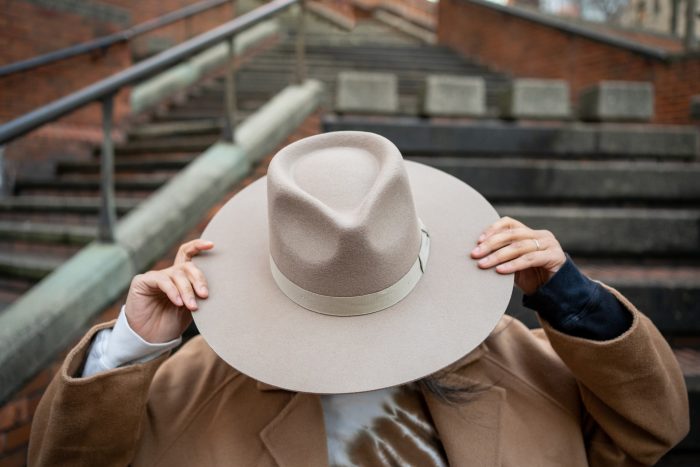I would love to say that I had chosen to age gracefully and decided to naturally let my hair go gray.
However, that would not be the truth. For me, it was the tumbleweeds of my long, dark hair that showed up at my bedside after each hair dye that asked me to stop coloring my hair.
Late last Fall, I found myself wrapped in a pale blue gown, telling my doctor that along with the mountains of hair piling up on my hardwood floor, my bones ached too. She ran all the tests she could and it was concluded my symptoms were the products of declining estrogen and perimenopause.
The bottom line: this was all part of the many “necessary losses” that come with mid-life.
“We can treat your bones,” she said, “but you’re going to have to give the hair dye a rest.”
So I did what I had to do and went head-to-head with my grays: mind over matter. I ditched the hair dye and I told myself I would embrace my grays no matter how difficult the sight of them would be.
Although, this proved to be much easier said than it was done. During the first few months, I detested my gray roots more than I knew was humanly possible to hate something. I avoided looking at myself in the mirror and wore hats, scarves, or whatever I could find to cover my roots. If I could have worn a paper bag on my head without calling attention to myself I would have done it.
As it turns out I was vain, much to my displeasure, and embracing my outward appearance, which hadn’t been so easy to do before, was going to be all the more challenging.
Yet, as if my self-deprecation wasn’t enough to endure, there was criticism, a lot of criticism, and a lot of “why” questions from everyone around me:
“Why did you stop coloring your hair?”
“Why don’t you try this or that remedy?”
“Why can’t you wear a wig?”
“Why don’t you try hair extensions?”
My hair was the topic of every conversation I was having—unwillingly and unprovoked. It also was the one conversation I was certain my male counterparts were not taking part in. I envied middle-aged men who confidently passed me by on the streets. I admired their aging bodies, shaved heads, and booming, testosterone-filled voices. I had already felt unseen at deli counters and by cashiers as a 50-something woman, but having multiple tones of gray hair made matters all the worse. Now, even when my number was called I was passed over.
And even though I had not asked any of my female friends their thoughts on going gray for themselves, they felt obliged to justify (ad nauseam) why they would never do such a thing. My gray hair, and my presence alone, strangely felt like a referendum on aging. It was, somehow, a reflection upon them and not something I happened to be doing or going through. I was the memo telling all the women in my life that they were getting older.
Most of my girlfriends (with a few exceptions) would pierce deep into my gray roots and visibly shudder. Others said nothing at all, but there was this large gray elephant in the room with us. Their eyes and attention never left my scalp and they rarely asked if my symptoms had flared up or subsided. The topic was off-limits. I felt like I had let them down as if I took off my pink ladies jacket and gone rogue—socially.
There were positive reactions from men—to my surprise. I was certain it would have been the other way around. I assumed my female friends would have been my cheerleaders, my support system, sending pictures of women rocking their gray hair and offering ideas on how to best style my hair.
But it was the men in my life who truly stepped up. Sure, they made their comments and joked around, but none of it felt judgmental. Men mostly fell into two categories: a) those who hardly noticed and could care less or b) those who liked it and complimented it.
The first group was refreshing and mostly filled with men above the age of 40. They helped me keep my perspective. They laughed with me and pointed out their own balding or greying scalps. Many told me about their sore backs and wobbly knees and made references to their ever-increasing bellies. They seemed to accept their losses as the price they paid for living the life they wanted to live. I felt like the little sister to a secret fraternity I never knew existed.
The second group completely took me off guard. I mean, I assumed all the upkeep and maintenance I’d been doing for all these years was to be seen as desirable or attractive to men. But the men in my life, especially my husband, couldn’t care less—not an iota. Evidently, and unbeknownst to me, the grooming had been in part for myself but mostly to placate other women.
At first, I took the compliments I received from the men about my gray hair as insults and would roll my eyes. I knew my hair for what it was: unruly, brassy, and stubborn. But they said otherwise and they were serious. They’d look at me deadpan in my eyes and insist I listen to them. They’d say, “You look great with gray hair,” or “Your hair makes you look chill and worldly.”
Then, there was the compliment of all compliments. I received it about nine months into my graying journey. It was from a 20-something-year-old who is a close friend of the family. He said, “It’s hot, you look hot.” I had been called many things in my life, but “hot” had never been one of them.
That was the turning point for me and when I realized that what was hot about me had nothing to do with my hair or my appearance. It was my developing sense of self-worth.
I quit resisting the aging process.
I was taking lessons from the men in the secret fraternity and coming to terms with the inevitable. I did not hate my hair, my appearance, or myself as I had before. I didn’t love any of it either, but I was learning to feel neutral and be unattached to it. I swore off of the hats and just let myself be.
I was practicing presence as it was the only way I knew how to move through my sordid feelings. I wanted to be kind to myself even if the world felt disapproving and disappointing. It took a full nine months, but I wasn’t hiding any longer.
I heard myself in the voice I reserved for when my children were little. I calmed my breath and told myself to keep everything in perspective. I remembered that my hair was only hair, that it would grow again or not, but I was more than my hair and what I looked like. I often thought of those I loved who were no longer with me and those who loved me despite it all. I reminded myself of those who were suffering from illness, social unrest, and hunger. My hair issues felt so small whenever I did this. They were valid issues, but they were just bad hair days in the grander picture.
Moments before I received that “hot” comment I had been sitting down and writing a list of what I appreciated most in my life. It was an extensive list that day. I stopped censoring my daily gratitude list when I stopped critiquing myself. I remember the smell of coffee had made the list that day. Being grateful even when I believed things inside of me were falling apart soothed my soul. I’m certain that this is what the young man picked up on and called hot.
Being at peace with ourselves is hot.
I wish I could say I fell head over heels for my gray hair and that everything I experienced made the color of my hair irrelevant. But that wasn’t what happened. I colored my hair as soon as I could, almost one year to the day. I’m still vain, but I’m way more appreciative and tolerant of the body that carries me and allows me to traverse the human life cycle.
I know that if I’m lucky enough, time will move me forward and that it’s best to go with it, not against it or get stuck in the way it used to be. I learned that my appearance will be ever-changing—for the better, the worse, and even the ugly. Yet, regardless of how I present myself, it is my responsibility to attend to my inner world because beauty, as I’ve learned, truly does radiate from the inside out.
~
Please consider Boosting our authors’ articles in their first week to help them win Elephant’s Ecosystem so they can get paid and write more.












Read 10 comments and reply